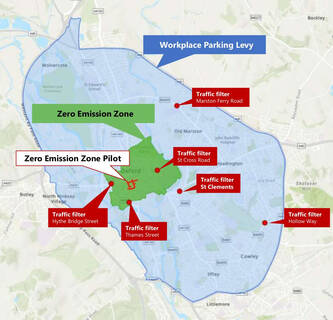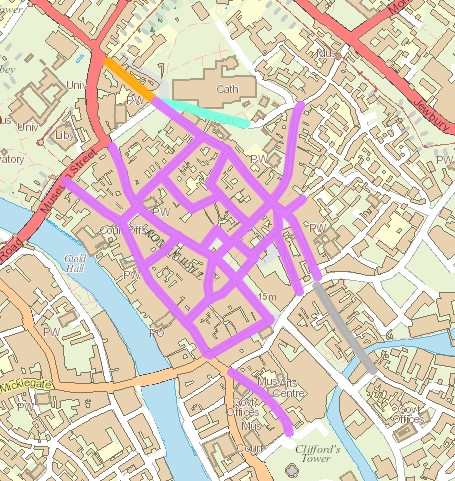A scheme for High St should be included in the Central Oxford Movement and Place Framework. High St is a major pedestrian corridor, hosts a large number of shops, is a major bus corridor with some of the busiest bus stops in the city, and is a cycle route used by over three thousand people a day.
But High St has never been designed for this mix of uses: it still has pretty much the same layout it had before the bus gate was put in in 1999. It is poor for walking (the footways are too narrow and crossing the wide carriageway with buses blocking visibility can be a real challenge), poor to terrifying for cycling, and far from ideal for bus services, either for bus movement or for passenger boarding and alighting. And the cramped footways and poor visibility can make accessing - or even finding - the shops difficult.

road injuries on High St, 2014-2023
more
Central Oxford lacks any kind of playground, or even any kind of public "run around" green space. Twice I have been stopped by tourists and asked where they can take their children to play. Lots of residents tell me they would spend more time in the city centre if they had somewhere they could let their kids run around in between shops or museums.
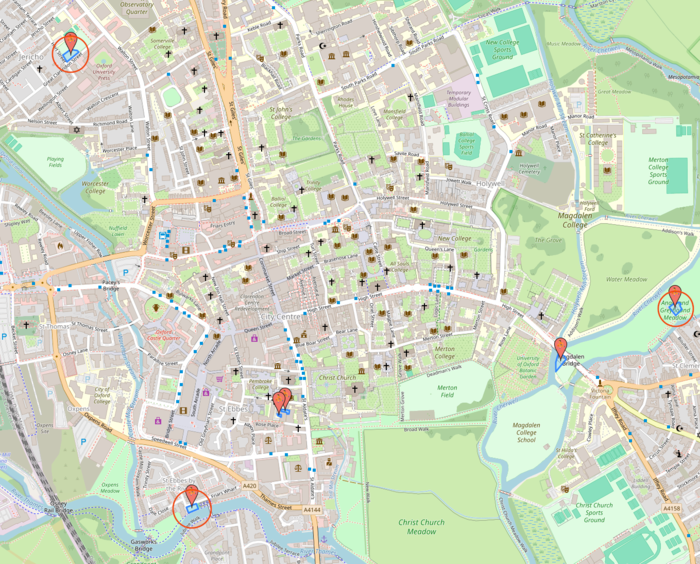
the three nearest playgrounds are circled; the ones identified by Open Street Map at the Story Museum and inside Magdalen College School are not public
The nearest public playgrounds are quite some way away. From Carfax, Friars Wharf is 900m, Great Clarendon St 1.3km, and Angel and Greyhound Meadow 1.6km. All of these require dealing with at least one main road; none of them have public toilets or baby-changing facilities. The grassy area outside the Natural History Museum offers some "run-around" space, but that's still a kilometre from Carfax. more
The legal changes to Broad St have been made permanent, but the current layout is clearly still temporary, in the sense that many of the features of the area no longer reflect its actual use. Most obviously, most of the existing kerbs are now redundant, or in the wrong place, and serve only as a trip hazard.
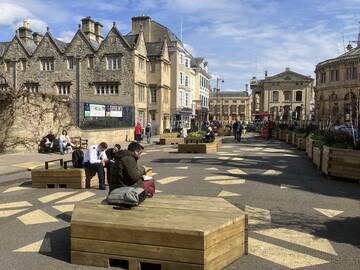
sitting around
A proper plan for Broad St needs to be part of a redesign of the entire area of the city centre north of High St and east of Cornmarket, as envisaged in the Oxford Preservation Trust's proposals twenty years ago, and any such plan will be dependent on funding which is not yet available. But there are possibilities in the management of vehicle access and parking for improvements that could plausibly be implemented in the shorter term. more
This outlines a plan for a direct, coherent east-west foot-cycle route across Oxford's city centre. That would run from the railway station across the north of Frideswide Square, along Hythe Bridge St, George St, Broad St, Holywell St, and Longwall St, ending at Magdalen Bridge. This would mostly be a "cycle street" - designed to take some local motor traffic, but prioritising cycle movements - except for a cycle track on Frideswide Square (which carries way too much motor traffic for a cycle street implementation).
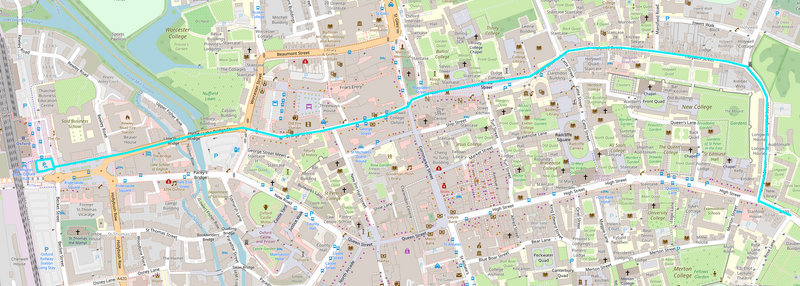 more
more
Oxfordshire's cabinet recently adopted a "decide and provide" approach for transport planning, but that doesn't seem to be informing the plans for the traffic filters in the Central Oxfordshire Travel Plan. The St Cross traffic filter and cycling on Magdalen Bridge provides one example of this. more
Zero Emission Zones (ZEZs) such as Oxford's should be reworked with general access restrictions that address all the harms done by motor vehicles, not just tailpipe emissions. In particular, Oxford's fails to address either particulate air pollution or road danger. more
The junction of Longwall St and High St, in Oxford, poses some unusual design challenges. Along with Magdalen Bridge and the Plain roundabout, it is a key bottleneck in Oxford's transport network — this segment is probably the second busiest cycle route in the UK and likely the second busiest bus route. There are huge problems with this junction as it is, but the core schemes in the forthcoming Central Oxfordshire Transport Strategy offer a chance to redesign it.
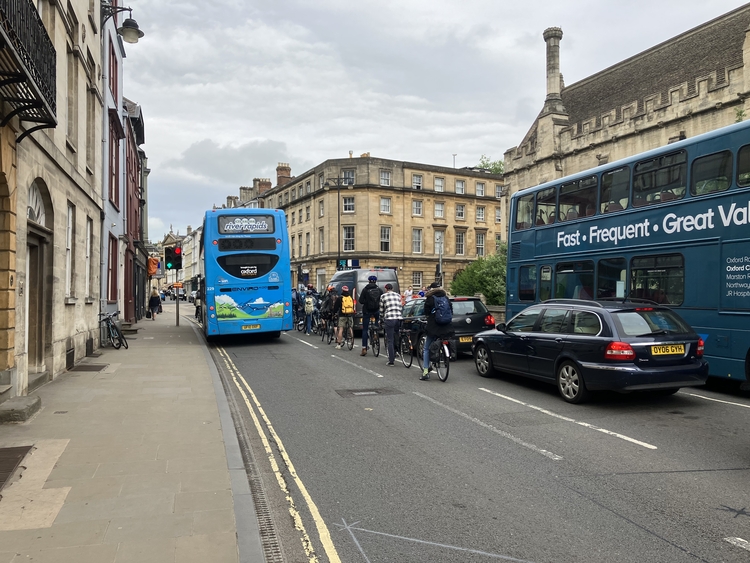
people cycling wanting to turn right into Longwall have to wait in a one metre wide lane with motor traffic on both sides
more
How should the planned Oxford traffic filters work: what hours should they operate, what exemptions should there be, and so forth? To understand this, we need to understand their purposes:
- to allow space and time to be reallocated to make walking and cycling safe and accessible, especially at junctions
- to stop buses being congested and delayed, to have better and more efficient bus services
- to free up space (and reduce noise and air pollution) for an improved public realm
But while the goals may be the same, the unique geography of each filter — and the very different roads they are on — means that they may need quite different implementations. This can be illustrated by Hythe Bridge St and Marston Ferry Rd. more
Based on a four day visit to York, I think its city centre should be a model for Oxford's. York has pedestrianised a huge chunk of its centre, and it's really great to walk around. After a bit it just feels entirely normal, just as it does in similarly pedestrianised European cities, and it really shows up just how horrible walking around central Oxford is.
At least during the daytime, outside loading hours, there are no cars at all, moving or parked in the core area of York. This means that one never has to think about traffic at all, or even about getting around parked cars, which makes for a completely different feel to bits of Oxford such as Catte St or Turl St or New Inn Hall St or Merton St or Pembroke St, where anyone walking is likely to encounter at least one moving motor vehicle and many parked ones. more
Walking around Oxford's city centre can be pretty unpleasant, as I've written about before. But that pales in comparison with how awful it is for cycling. Yes, there are lots of people doing that, but there are even more people who simply will not cycle in central Oxford because it is too hostile and unpleasant. more
I cycle pretty much past Oxford's Covered Market (down Turl St) daily, on my way home from work, and often want to get fresh vegetables or meat. But I never go there, because there's no bike parking. more
Central Oxford is severely space constrained. It suffers from bus and vehicle congestion, and not enough space is provided for people walking or waiting for buses or admiring the buildings, for proper bus layovers, or for safe cycling routes. Creating more space is not an option, so there is no way to do anything about these problems without shifting people from the least space efficient mode — private motor vehicles — to more efficient modes — buses, bicycles, or feet. One key tool for achieving this would be an access charge for motor vehicles. more
The recent Phil Jones Associates' "Oxford City Centre Movement and Public Realm Strategy", commissioned by the city and county councils, proposes a radical reworking of Oxford's core in favour of public space and active travel. This offers an escape from the transport "swamp" the city is currently stuck in: the alternative is stumbling along, flailing about but sinking deeper into the quagmire. Everyone concerned about air pollution, congestion and barriers to walking and cycling in Oxford should push the councils to take the proposals in this report, give them flesh, and put them into (respectively) their Local Plan and Transport Strategy. more
The recently redesigned Pembroke St is attractive, but also seems a lost opportunity.
Previously it was a fairly traditional lane, with a carriageway and pavements. The new design keeps essentially the same layout, only replacing the kerbs with gentle "gutters" or brick edging, on as far as I can tell exactly the same line, and changing the (still too narrow) footpaths to a "brick" surface. The other substantive change is that the street is now two-way for cycling (motor traffic is still allowed to enter only from St Ebbes). more
I've mostly discussed cycling in this blog, but I thought I'd turn my attention to walking, starting with a look at central Oxford, roughly defined as the region frequented by tourists. more
UPDATE: it is hardly a showcase yet -
much more needs to be done - but the parking has been removed from Broad St and it has been partly pedestrianised.
The Plain is being rebuilt and ambitious plans to redesign St Giles have been floated, but for me the most obvious redevelopment for central Oxford, the one that will cost the least and deliver the most, is Broad St. All that is basically needed is to remove the car parking, remove the kerbs and resurface the entire area, drop the speed limit to 10mph and time-restrict loading access, and Oxford could have a showpiece central square. more






